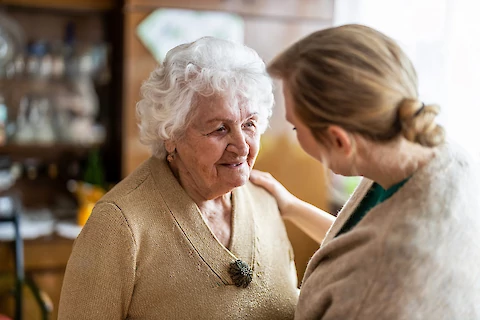
It's important to monitor our loved ones, especially after the age of 65, for any signs of cognitive decline. These signs can point to a larger health problem, such as dementia symptoms related to aging, Alzheimer's Disease, and Parkinson's disease.
Safety is the foremost responsibility of any caregiver and an older individual's safety can be compromised with such a decline. Familiarity with the signs of dementia, and other related diseases, can help family caregivers get their loved ones the medical attention and assistance they need.
Signs of Cognitive Decline
Cognitive decline is a serious issue and those with the diagnosis need support as early as possible. A caregiver can observe your loved one when you are unable to be there.
- Forgetting words, names, important or recent events
- Feeling overwhelmed and/or overstimulated
- The appearance of confusion when making simple decisions
- Increasing impulsivity and noticeable behavioral changes
- Losing the ability to concentrate; tending to check out or change direction in conversation
- Increased instances of disassociation, both physically and psychologically
Cognitive decline can be a natural part of the aging process. However, it can also be a symptom of a disease, such as Alzheimer's and Parkinson's Disease. Identifying the signs early can potentially lead to an early diagnosis and treatment. Documenting signs of early decline can lead to more informed treatment options.
Documenting Signs of Cognitive Decline
It's very helpful to document the signs of cognitive decline. This way, the care older individuals receive can evolve with them. The information gained by documenting can help the doctors and other caregivers see the progression and adjust care as needed. The doctors can use the same information to help them make a more accurate diagnosis and create a quality individualized care plan.
Keeping a casual notebook or date book from your phone or computer to document the symptoms of cognitive decline will allow everyone involved in the care of the individual to share information, identify patterns, and tailor a supportive and personalized home care plan that is appropriate. The time of day the behavior occurred is also important. Include the date, an explanation of the behavior, and all sources of essential information.
When an elderly loved one spends much of their time alone, it can be more difficult for a friend or family member to notice the signs of decline. When family and/or close friends and caregivers are present, much of the time can be spent on chores, going to the doctor, or otherwise helping them fulfill their daily activities.
Most Effective Caregiving Practice
For many people, the most effective caregiving practice they can adopt to increase their time with their loved ones and monitor their cognitive health is to help them age in their homes, where they are comfortable and familiar with the routine. Help is available for those who desire to spend more time with their loved ones.
A professional caregiver can help keep an aging loved one on track with their routine and help them with their daily tasks. When the dishes are done, the clutter removed, and the aging individual's needs are met, a companion and/or family member can actually sit down, hold the older person's hand, and talk. All the senior needs to reach that place is a little help. A personal companion supports the goals of the family, as well as the individual in their care.
Senior Helpers of Hillsborough County, and the surrounding communities, including Riverview, Brandon, and Tampa, offer in-home services for seniors. We make aging in place a possibility for seniors throughout our community. We have programs that focus on an individual's personal needs, offering specialized support for those with Parkinson's, Alzheimer's, and dementia.